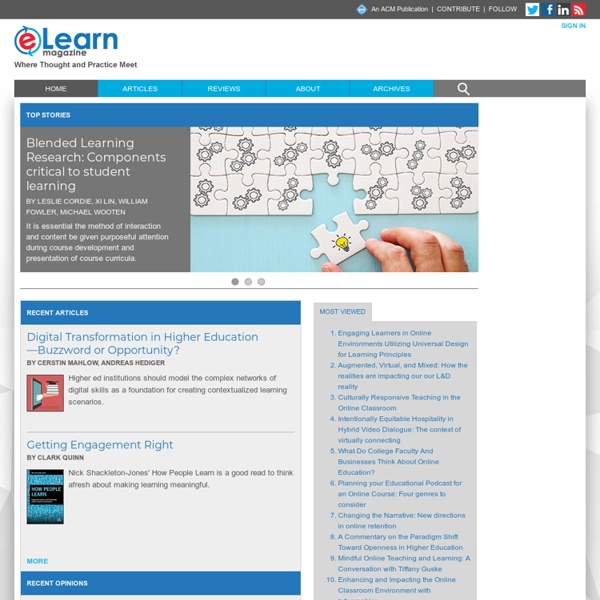



British Journal of Educational Technology The impact of mobile learning on students' learning behaviours and performance: Report from a large blended classroom Minjuan Wang, Ruimin Shen, Daniel Novak, Xiaoyan Pan Face-to-face versus online tuition: Preference, performance and pass rates in white and ethnic minority students John T. E. Supporting social awareness in collaborative e-learning Niki Lambropoulos, Xristine Faulkner, Fintan Culwin The Buddha's distance learning consult Keith B. Mobile practices in everyday life: Popular digital technologies and schooling revisited Guy Merchant Effective professional development for e-learning: What do the managers think? Using reflection triggers while learning in an online course Dominique Verpoorten, Wim Westera, Marcus Specht Social Networking and Mobile Learning Edited by Norbert Pachler, Maria Ranieri, Stefania Manca and John Cook Volume 43, Issue 5, (September 2012) Learning objects in progressEdited by Michael Klebl and Bernd J.
New Society for the Diffusion of Knowledge (NSDK) PLANE elearnspace. everything elearning. Services | WritersandPoets.com Odder Gymnasium :: Forside The Journal of Distance Education / Revue de l'Éducation à Distance The Journal of Distance Education is an international publication of the Canadian Network for Innovation in Education (CNIE). Its aims are to promote and encourage scholarly work in e-learning and distance education and provide a forum for the dissemination of international scholarship. Original material in either English or French is invited in three broad categories: (a) Scholarly articles and research papers that focus on issues related to e-learning and distance education; (b) Reports that highlight unique solutions to critical problems, short descriptions of work underlying new or innovative programs or contemporary events, and brief notes on research in progress; and (c) Dialogues devoted to the discussion or debate of issues in e-learning and distance education that may arouse controversy. Also included here will be papers written in reply to articles published in earlier issues of the Journal. Vol 28, No 1 (2014) Table of Contents From the Editors Research Articles
If you procrastinate the right way, life will be easier and more productive for future you The dotted line principle: Start today, fill in the gaps tomorrow There are a thousand ways to write. This is one way to do it. Best of all, you can apply this method to design, learning, development, business, and even your personal life (if you so choose). It works for me but will definitely not work for everyone. So take it with a grain of salt. Work on what you believe will make it easier to work tomorrow. For me, starting and completing a shitty first draft makes it easy to rewrite or edit tomorrow. It’s easier to fill in the blanks than to start something from scratch. When most people sit down at their word processor, they expect to get it right in one take. Writing doesn’t have to take a long time. The Dotted-Line Principle A friend of mine recommended Jake Brown’s book on Tupac’s studio process. He left behind so much music that almost two decades after his death, and several posthumous albums, there’s still plenty of unreleased music. You Will Improve
Skoleudvikling UVM 29 - Diciembre 2011 Innovar en la enseñanza de grado. Crónica de una experiencia de trabajo grupal en entornos virtuales. Analía Chiecher y Danilo Donolo Resumen El artículo describe una experiencia de innovación pedagógica implementada en nivel de grado. Texto completo en formato PDF Abstract The article describes an innovation experience implemented with college students. El componente vivencial como factor central en la integración de tecnologías para la enseñanza y la investigación. Marcelo Dorfsman Resumen En este trabajo nos proponemos analizar la problemática de la integración de las tecnologías en la enseñanza y en la investigación, entre docentes e investigadores pertenecientes a instituciones de enseñanza superior. Esta investigación se llevó a cabo mediante el seguimiento de dos cursos de capacitación en línea, para docentes de nivel superior de una universidad en la República Argentina, de los cuales participaron 48 docentes e investigadores. Abstract Eloiza da Silva G. Resumo Resumen Abstract Resumen.